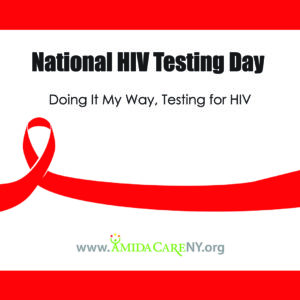Test for HIV Your Way, and Do It Today

National HIV Testing Day on June 27 is not just about the statistics, though they are important—one in seven people are living with HIV and don’t know it. National HIV Testing Day is all about you and making sure you have the best life possible.
The Centers for Disease Control and Prevention (CDC) recommends that everyone 13 to 64 years old get tested for HIV at least once. New York State recently removed the upper age limit for offering an HIV test. If you are at high risk of infection, you should get tested more often (such as every three to six months).
Risk factors for contracting HIV include having sex without a condom with someone who is HIV positive or whose HIV status you don’t know; having sex with many partners; and injecting drugs.
Three Reasons to Get Tested
1. HIV tests are easy to get, either at a clinic or at home.
It has never been easier to get tested for HIV. It’s confidential, and often free or low-cost. Here are three ways to get tested:
• Go to a testing site, which can provide in-depth counseling and other services. Find a free or low-cost sexual health clinic in New York City here.
• Go to your clinic or doctor’s office
• Buy an over-the-counter home test, available online or at the pharmacy without a prescription
Results usually are available almost immediately with an at-home kit as well as in many clinics, testing sites, and doctor’s offices. Home tests provide confidential counseling and referral to treatment. If you test positive, you can expect a follow-up test to confirm the results.
2. The worst HIV status is unknown.
It’s essential to know your HIV status so you can be linked to care and treatment services. Medicines to treat HIV are more effective than ever and have fewer side effects. The sooner you begin treatment, the less HIV can damage your body and your immune system, and the less likely you are to pass HIV to someone else. A delay in treatment could cause long-term medical complications.
3. Undetectable equals Untransmittable: U=U. Knowing your status is the first step to protecting yourself from either contracting or transmitting HIV.
If you are HIV negative, you can continue to take steps to avoid contracting HIV, such as using condoms during sex or accessing the HIV prevention tool pre-exposure prophylaxis or PrEP.
If you are HIV positive, adhering to antiretroviral treatment can help get your viral load to an undetectable level, which makes it virtually impossible to transmit the virus to others. Your health care provider will help you decide what HIV medicines to take.
Resources
About National HIV Testing Day
More Information
Amida Care currently serves 7,000 members throughout the five boroughs of New York City, including people living with HIV/AIDS; people of transgender experience, regardless of HIV status, and people who are experiencing homelessness, regardless of HIV status. Confidential answers are available at 1-855-GO-AMIDA (1-855-462-6432) (TTY 711).
